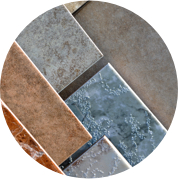Ceramic Flooring Material Prices
Updating the flooring in your home is one of the most worthwhile home improvement projects that you could possibly engage in, refreshing your home’s look and providing you a great deal of utility depending on what type of flooring option you choose. Although you have a lot of flooring types at your disposal, possibly your best choice in terms of cost, installation ease and a variety of styles is ceramic tile. Ceramic tile is increasing in use across the country, and it’s easy to see why when you examine all that ceramic tiling has to offer. However, before you begin your tiling project it’s important to examine the factors that might affect the costs of ceramic tile installation.
Ceramic Tile Cost by Components
Like any home improvement project you’ll embark on, the cost for installing ceramic tile can be influenced by a number of factors. The four biggest influences on the final cost of your ceramic tiling project can include:
- Ceramic Tile Floor Cost
- Labor Cost
- Ceramic Tile Floor Material and Supply Cost
- Optional Costs
In addition to the aforementioned component costs—the largest expenses of your tiling project—you’ll also need to consider exactly how you’ll complete your project, which can greatly alter your costs. The two different labor paths that can affect your ceramic tile cost are:
- DIY or Hire a Contractor
- Contractor Hiring Tips
More than any other decision related to your planned ceramic tile installation, you need to choose the right time to begin your project. Planning your project to fit into your life is extremely important in successfully completing a tile installation. However, before you can begin your project, it’s crucial that you do your research so that you're prepared for every step of the process, including associated costs.

Ceramic Tile Floor Materials
Ceramic tile, perhaps more than any other floor type, offers homeowners a wide variety of choice, both in terms of construction material and design. What this means in terms of your of tiling project is that you’ll be able to find a type of tiling that will suit your home perfectly. When trying to determine the right tiling for your home, however, there are a number of factors that you need to consider before making your choice. For starters, it’s a good idea to think about the rooms you're planning on tiling, paying special attention to how much traffic these areas generally experience. Before you make an ultimate decision as to what tiling material you will use, you should be sure to evaluate the individual costs versus how much utility you can expect to get out of a given tile type.
Ceramic Tile Floor Material Cost
Ceramic tile, because of the wide range of materials used in production, can vary wildly on price. For example, less expensive tiles cos start from $0.65 while exotic tiles might cost $100+ per square feet. The total cost of your tile material can rely on a number of factors, including the construction material that you choose and any intricate designs possessed by said tile. Generally speaking, glazed tiles will cost slightly more than unglazed tiles, but may offer you more in terms of utility and variety of materials and design. When trying to choose the right tile type there are a few factors that you should discuss with your contractor, such as: what tiling fits in your budget, how much durability you need and what areas of your home will be included in your tiling project.
Mortar
One aspect of a ceramic tiling project that many homeowners are unprepared for, both in terms of labor and material cost, is laying down the mortar. The mortar provides the base to lay down your tiling, and can add to your overall costs depending on what type of mortar you choose to use. They type of mortar that you use entirely depends on what kind of tile you’ve selected for your project. For example, an organ mortar should not be used for ceramic tiling. Also, the shade of your mortar should complement the shade of your tile in order to prevent color confusion. Before choosing a mortar for your project, consult with your contractor to see what type of mortar might be right for you.
- Ceramic Floor Installation Cost Calculator
- Ceramic Cost
- Ceramic Tile Flooring Patterns and Types
- Ceramic Tile Grout Types
- Places Where Homeowners Can Install Ceramic Tiles
- Ceramic Tile Maintenance
- Where Homeowners Can Buy Materials
- Ceramic Floor Installation / Labor Cost
- To DIY or Not: Problems and Limits
- Contractor Hiring



Comments
Comments are disabled for this post